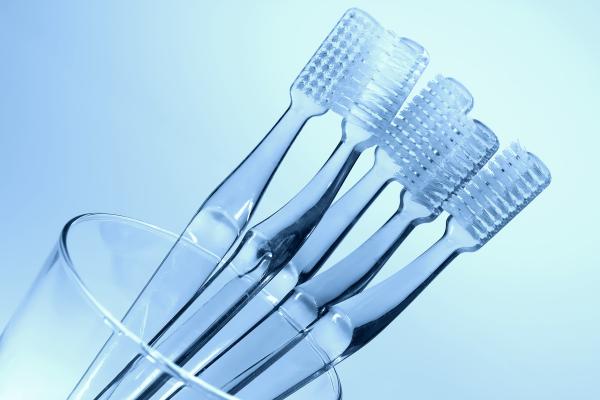Oral Hygiene Basics Albuquerque, NM
At Family & Cosmetic Dental Design, we help patients throughout Albuquerque to stay in excellent oral health. With a focus on preventative care, we take the time to get to know each of our patients, creating a plan for lifelong oral health. With only one set of permanent adult teeth, it is important to care for them and be proactive in taking the steps to prevent cavities, infections, and gum disease. We recommend that you visit our dental office for a teeth cleaning twice a year so that we can remove plaque buildup and tartar, keeping your mouth healthy and clean. To schedule an appointment, call (505) 883-3722. In the meantime, here are steps that you can take at home to keep your mouth healthy.
How to brush your teeth properly
As a Albuquerque dentist, we know that how you brush your teeth is just as important as how often you brush them. It is important that you use a soft toothbrush that will not irritate your gums or cause the enamel on your teeth to erode. Many people make the mistake of thinking that a hard toothbrush is necessary for keeping teeth clean, but this is not the case. As long as you brush correctly a soft toothbrush will work equally well without damaging your teeth. Be sure to brush your teeth in a circular pattern, starting at the gum line and working your way towards the center of your mouth. This will move food particles, bacteria, and plaque away from your gum line. Brush your teeth in quadrants and be sure to brush each section for at least thirty seconds. While brushing you should apply even pressure but not be too aggressive. You should also use fluoride toothpaste since this will provide additional protection from cavities. We recommend that you brush three times a day – morning, after lunch, and before bed. This will keep your mouth clean without causing irritation from over-brushing. Additionally, be sure to buy a new toothbrush every three months or sooner if your bristles are frayed or your toothbrush is stained or smelling.
Flossing is essential for your teeth and gums
At Family & Cosmetic Dental Design, we remind our patients that it is critical to floss on a daily basis. If you live in the Albuquerque area and have not been to the dentist lately, we invite you to schedule an appointment so that we can clean your teeth and remove the plaque and bacteria from hard to reach places. Afterward, it is up to you to floss on a daily basis to remove food particles and plaque from in between your teeth. If they remain in place, you can develop gum disease which is both uncomfortable and dangerous to your oral and overall health. Gum disease occurs when plaque forms underneath the gum line and not flossing can lead to this. If you do not particularly enjoy flossing, buy a plastic flossing tool that you can hold and throw away once done. This makes it easier to get the job done.
Selecting the right mouthwash
When you use mouthwash, it is important to be sure that it is sugar-free. We also recommend using mouthwash that contains fluoride since this will help to kill any lingering bacteria while strengthening your teeth. Carry a bottle of mouthwash with you and rinse your mouth with it after meals, drinking a soda, or consuming coffee. As a Albuquerque, NM dentist office, we understand that it is difficult to brush more than a couple of times per day. Rinsing your mouth, however, is relatively easy, and everyone has time for it. Taking this simple step can help to reduce your risk of cavities and gum disease.
Check out what others are saying about our oral hygiene support services on Yelp: Oral Hygiene Basics Albuquerque
How to prevent tooth decay
Our team prevents tooth decay every day by helping our patients to have clean and healthy teeth. Tooth decay starts when plaque is left on the teeth, and the acid inside of it starts to eat away at the enamel. Keeping teeth clean by removing plaque, therefore, prevents tooth decay. Simultaneously, at home you can continue to brush your teeth and floss after meals. If you do not have anything with you, rinse your mouth with water. This will help to remove some of the loose food particles that may be in your mouth or to remove some of the sugar from your teeth. You should also eat a healthy diet since everything that you eat is directly placed onto your teeth.
What you should know about getting a fluoride treatment
At Family & Cosmetic Dental Design, we are a family dentist office that uses fluoride on a regular basis. We recommend that all of our youth patients under the age of eighteen have a fluoride treatment, at least once a year. Statistically, these treatments reduce the risk of getting cavities by 30 percent. This is significant considering that tooth decay is one of the primary reasons children miss days from school. Adults can also benefit from receiving a fluoride treatment and if you would like to find out if it is right for you, call 505-883-3722 to schedule an appointment. The treatment itself only takes a couple of minutes. The fluoride is applied directly to the teeth. It has no odor or smell and after a few minutes, patients are free to leave. It is one of the easiest ways to prevent cavities.
How to select the right toothbrush
Patients of our general dentist office are given a toothbrush at each visit. We recommend that you use it for three months and then replace it. When purchasing a toothbrush, look for a soft one that will not irritate your gums or erode your enamel. Otherwise, we suggest a battery operated or electric toothbrush since they can give you the best clean. The toothbrush head rotates while you are moving the brush around, helping you to break up more plaque for the cleanest possible teeth.
Food and drinks that you should avoid
As a family dentist office, we recommend that you avoid drinking too much soda, juice, coffee or anything that contains a lot of sugar. You should also stay away from candy, desserts, and particularly sour candy. Additionally, acidic fruit is bad for your teeth. Any time that you have a diet that is high in sugar and starch it is bad for your teeth because the bacteria on your teeth will thrive in this environment. Simultaneously, when you eat foods that are highly acidic, it can lead to enamel erosion. At Family & Cosmetic Dental Design, we recommend that you eat a diet high in green leafy vegetables, lean protein, dairy, and nuts since they can help to remineralize and strengthen your teeth. For more tips on how to eat a mouth-healthy diet, call (505) 883-3722 and schedule an appointment to speak with Dr. Forde.
Questions Answered on This Page
Q. Is flossing really important for my teeth?
Q. How can I prevent tooth decay?
Q. What is the best toothbrush for my teeth?
People Also Ask
Q. What are some methods for improving my oral health?
Definition of Dental Terminology
- Cosmetic Dentistry
- Cosmetic dentistry is generally used to refer to any dental work that improves the appearance (though not necessarily the function) of a person’s teeth, gums and/or bite.
- Decay
- Tooth decay is when the enamel of the tooth begins to decay and cause erosion from plaque and tartar on the teeth.
- Dental Caries
- Dental caries are also known as cavities and result from a lack of proper oral hygiene leaving plaque that forms tiny holes in the teeth.
- Dental Checkup
- A dental checkup is an appointment that involves cleaning the teeth, identifying any signs of infection and removing said signs of infection at least once every six months in the office.
- Dental Filling
- A dental filling involves restoring the structure of the tooth by using metal, alloy, porcelain or plastic to fill the tooth.
- Dental Prophylaxis
- A dental prophylaxis is a professional and detailed cleaning that involves the removal of plaque, calculus and stains from the teeth.
- Dental Sealants
- Dental sealants contain a resinous material that we apply to the chewing surfaces of the posterior teeth to prevent dental caries.
- Dentist
- A dentist, also known as a dental surgeon, is a doctor who specializes in the diagnosis, prevention, and treatment of diseases and conditions of the oral cavity.
- Gingivitis
- Gingivitis is the inflammation of gum tissue that results from plaque, other infections in the mouth and poor oral hygiene.
- Preventive Dentistry
- Preventive dentistry is the dentistry that focuses on maintaining oral health in order to prevent the spread of plaque, the formation of tartar and infections in the mouth.
- Tartar
- Tartar forms when plaque builds up on the surface of the teeth and calcifies into a hard surface that is much more difficult to remove and will require professional treatment.
- Tooth Enamel
- Tooth enamel is the protective visible outer surface of a tooth that contains the dentin and dental pulp.
Back to top of Oral Hygiene Basics




